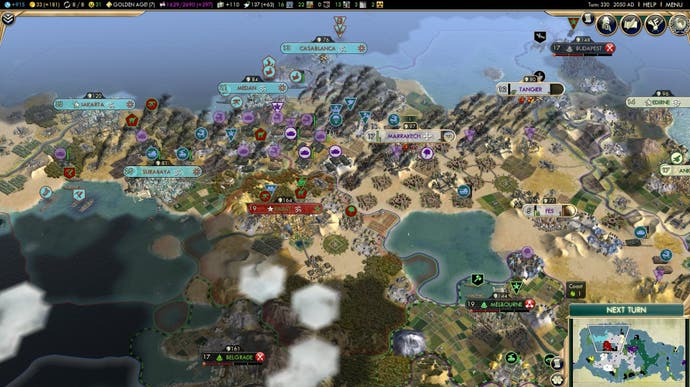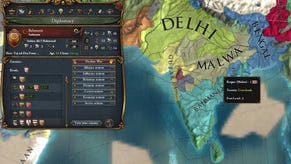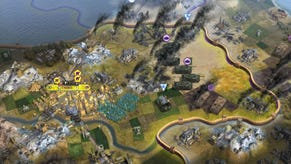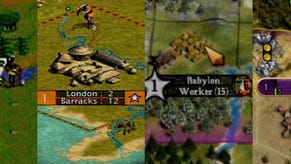How a five-year game of Civilization 5 became a meaningful part of my personal history
All roads lead to Rome. Eventually.
For the first 5000 years, nothing much happened. We must have embarked on our epic enterprise sometime in late 2013, though neither of us suspected we were about to spend the next five years embroiled in a seemingly never-ending coop hot-seat game of Civilization 5. If we had, we'd probably have played something else instead. It was folly, but by the time we realised, it was too late; we had become thoroughly invested, the game had taken on a life of its own, and there was nothing else but to see it to its (eventual) end. On and off, we kept chipping away at our task, sometimes meeting every few weeks for a couple of hours, sometimes once every couple of months. But soon our time with the game had to be measured not in months, but in years, and our game of Civilization had become a sort of parallel history to our personal lives.
When I sat down to prepare this article, it felt like historical or archaeological research. My friend and I compared notes, trying to reconstruct what had happened years ago. We gathered our save games from several machines, flash drives and Google Drive. I even rifled through ancient emails which mentioned our game in passing in the hopes of pinning down the timeline. In the end, the oldest save game we could find dates back to January 2016. After about 200 turns (and more than two years of playing), we had just entered the 1860s. After that point, our game is fairly well documented. Before, however, lies nothing but vast stretches of prehistory, a long dark age illuminated by nothing but the faint and flickering spotlights of our unreliable memories. It's easy for beginnings to get lost in the mists of time.
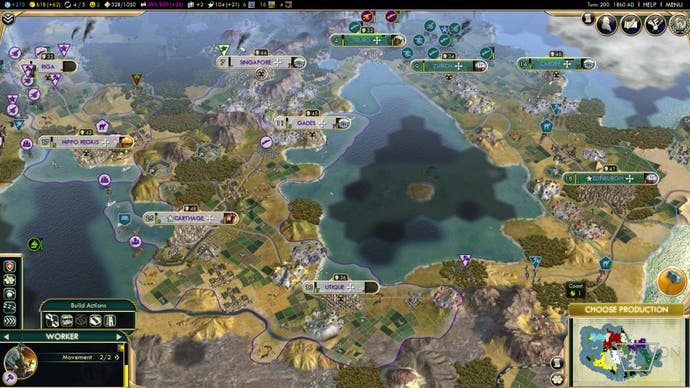
We started our game on either side of a vast lake set in a subcontinent, the south-eastern-most part of a Pangean super-continent. My early empire, Carthage under Dido, occupied the parts between the western shores of the lake and the ocean farther west. My friend's and ally's Celtic empire, led by Boudicca, lay to the east of the lake. We know for certain that soon after our early expansion, we ran afoul of another confederacy, consisting of Rome to the north and Greece to the west, for reasons largely lost to time (possibly, it was the Celtic annexation of the city state of Zürich which exacerbated tensions). Rome declared war against the Celts, dragging Carthage as well as Greece into the conflict. The Celtic city of Truro bore the brunt of Caesar's aggression. Over the course of several thousand years, Truro was taken and eventually retaken again and again, its population decimated in the process.
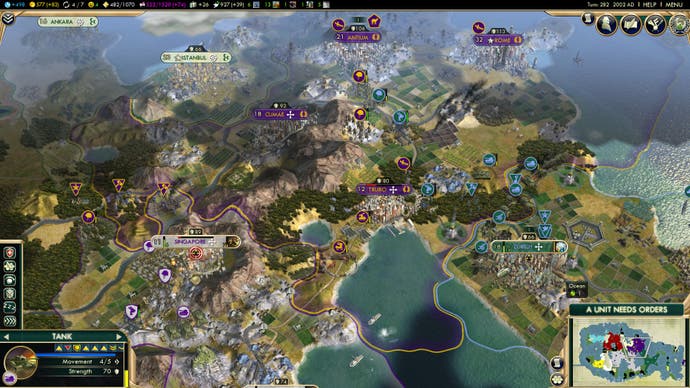
In a desperate attempt to bolster our position against Rome, we decided to annex the neutral city states of Singapore, which had the bad luck of being situated at a strategically valuable spot. The international community, however, didn't at all take kindly to what they saw as continued Celto-Carthaginian "war mongering", and relations never recovered. We were effectively cut off from trade or outside help, and it didn't help that Alexander the "Great" (damn his smug face) routinely used his political influence to outlaw the use of luxury articles our realms depended on, or put us under embargoes.
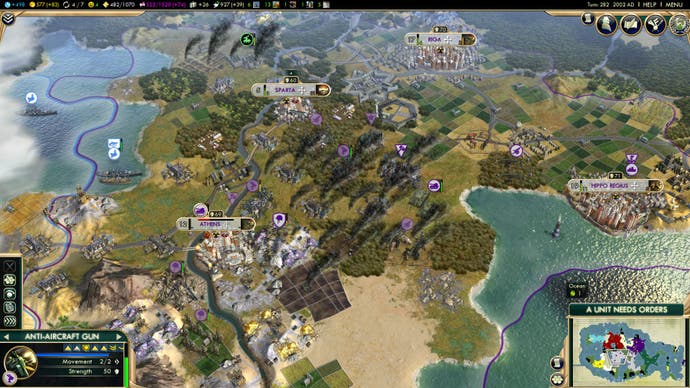

Sometime in the 19th century, things finally started to turn around. To the west, my Carthaginian forces, bolstered with mercenary forces, began their long march on Athens and laid siege to Sparta. The struggle for Sparta would be the bloodiest and most desperate conflict in history and would resolve itself only in the mid-20th century. By the early 21st century, the millennia-old trench war around Truro had finally resolved itself, and Rome as well as Athens had fallen. A reeling Alexander would drop a nuclear bomb on his own former capital and delay the end of the war by only a couple of years. Our old enemies lay defeated, forced to subject themselves to humiliating peace conditions. What followed was a world war, fought mostly against the one remaining superpower of Morocco and its allies, which, after a combined onslaught against the cities of Fes and Marrakech, ultimately led to our victory after a couple more decades.
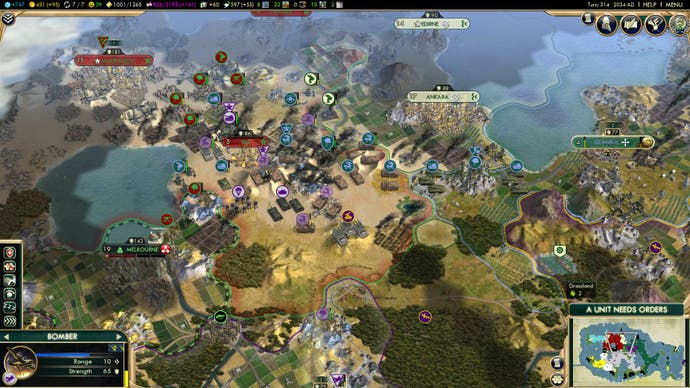
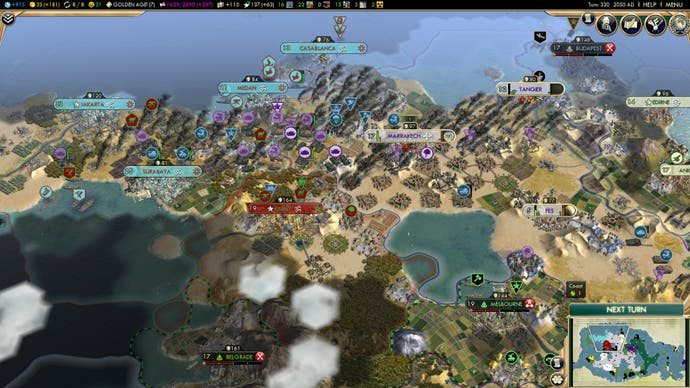
Ironically, the events of history outside of our game often seemed far more momentous by comparison. At the beginning of our long war against Rome and Greece, I was still in the middle of my studies and had just started my first real employment at the state archives of Zürich. When the struggle for Sparta began around 1860 (or 2016), I was wrapping up my master's degree. At the conclusion of 6000 years of near-constant warfare, in late 2018, I was well into my side project as a freelance game critic, looking for new employment, and about to get married to my girlfriend of 10 years. The youthful dog we'd adopted in 2013 had become old enough to enter a canine mid-life crisis. And while my Celtic ally may not have been entirely successful in establishing a world religion based on his favourite football player, he did manage to both begin and conclude his doctoral thesis during the course of our game. While the sluggish and vicious trench war of Truro continued nearly uninterrupted with little development for thousands of years, life outside of the game took its course.
It may not have been the most exciting game of Civilization 5 ever played, and despite our time commitment, we certainly weren't the most avid of players. In fact, we spent a considerable amount of time harping about the game, its glacial pace, its wonky diplomacy, its restrictive Happiness system, its poor communication of certain mechanics and features. We often spent more time chatting and eating pizza on game nights than actually playing. It was the first game of Civilization 5 we ever played together, and it will certainly be the last. And yet, over the course of many late nights spent strategising, our game of Civ had become The Thing We Do, a ridiculous project and an unending in-joke, but at the same time also something that had become important to both of us. A sense of history had grown around it, and the simulated history inside the game had become inextricable from the history of the two of us playing the game.
The end of the game also felt like the end of an era. It bridged the distance between a more carefree time mostly spent in academic pursuits and a more adult life with all its pressures, responsibilities, and (very occasional) rewards. It had become a small but meaningful part of my life narrative, my personal history. Many games demand large investments of time over weeks, months, or even years, and as a result can easily become linked to certain periods of our lives. That's especially true for games like Civilization, which are essentially designed for creating alternate histories that run parallel to the lives of its players. Nothing much may have happened during those first 5000 years, but I'm still glad we were there to witness them.
